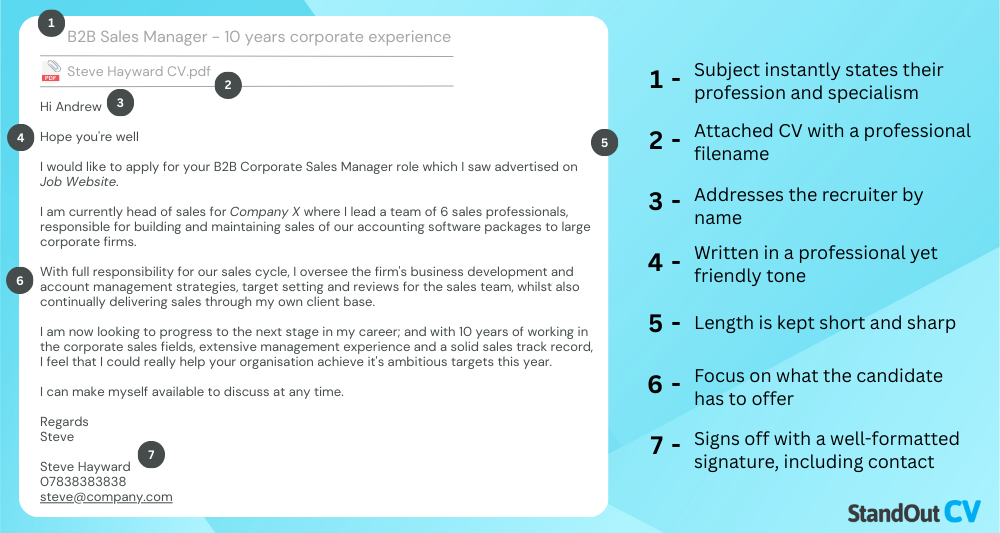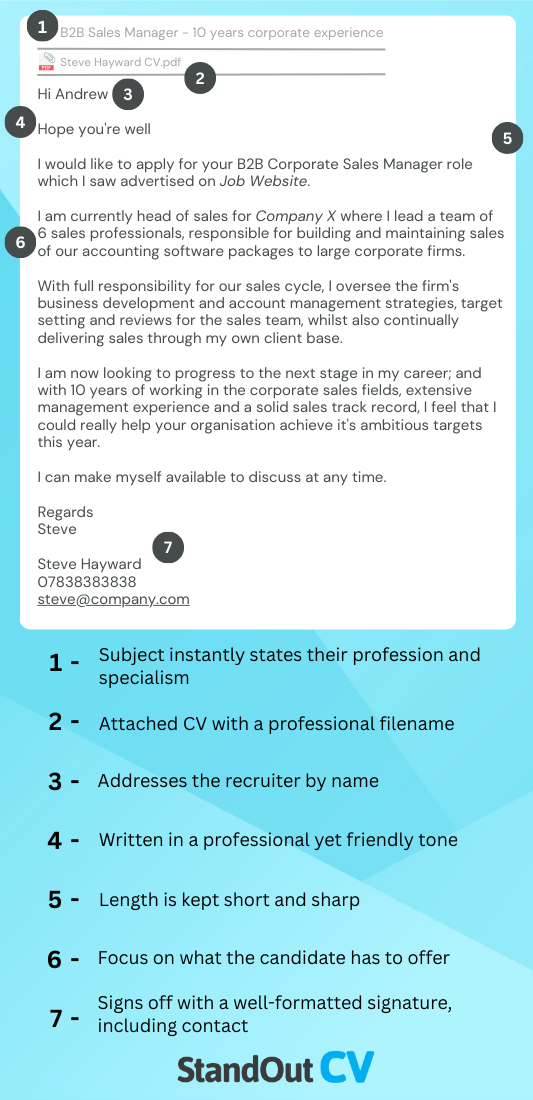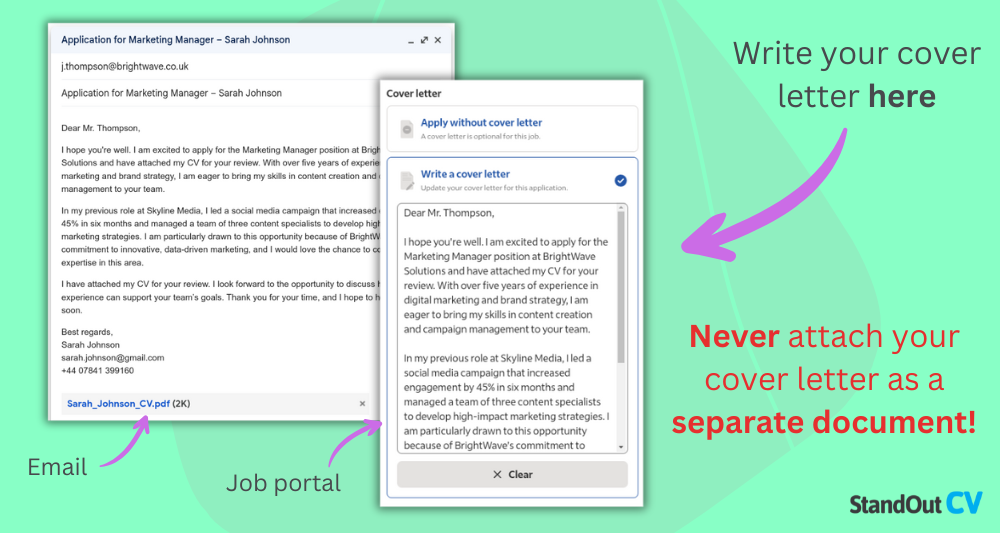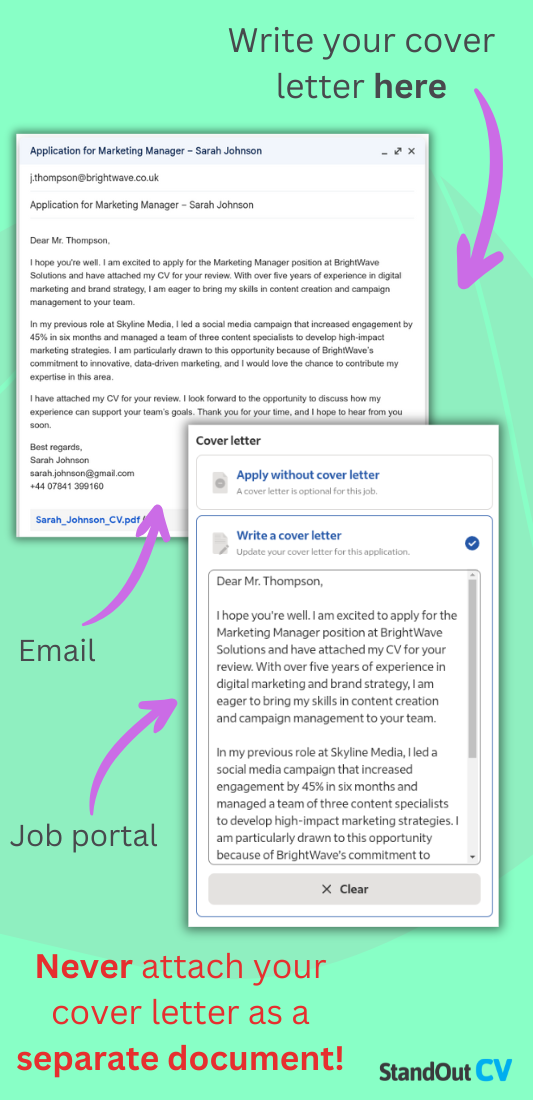I’ve read more cover letters than I can count – and most of them looked almost exactly the same.
Long-winded paragraphs, vague buzzwords, and nothing that actually convinced me to meet the applicant.
But every so often, a cover letter would stop me in my tracks and make me think: I need to interview this candidate.
A cover letter is your first chance to speak directly to an employer and show them why you’re the right fit.
In this guide, I’ll show you how to write a cover letter that does exactly that, with 10 CV cover letter examples you can use for inspiration.
What is a cover letter?


A cover letter is a short, tailored piece of writing that you send alongside your CV when applying for a job.
Its purpose is simple: to introduce yourself to the employer and highlight your most relevant skills, education and qualifications, experience, and achievements, while explaining why you’re motivated to work for their company.
Unlike your CV, which is more factual and structured, your cover letter is your chance to add a bit of personality and context. It shows not just what you’ve done, but why it makes you the right person for the role.
You’ll usually need a cover letter when applying for advertised jobs, but it’s equally valuable for speculative applications or networking approaches – any time you want to give employers more than just a list of qualifications.
Considering that recruiters only spend about 30 seconds reading a CV, a quality cover letter can turn a standard CV into one that recruiters want to read with greater care.
Cover letter examples
No experience cover letter
Good morning Darren,
Please find attached my CV in application for the Admin Assistant position at Meridian. While I am at the beginning of my career, I have already developed strong practical skills through part-time work, volunteering, and my studies, which I believe will allow me to contribute effectively in this role.
In my recent retail role, I regularly handled customer enquiries, processed transactions accurately, and maintained clear records – experience which translates directly into providing reliable administrative support. Through volunteering at a local charity, I was responsible for scheduling events, updating spreadsheets, and communicating with different stakeholders, which helped me become confident with Microsoft Office tools and maintaining organised systems.
I am someone who enjoys creating order, solving problems, and supporting others to work more efficiently. Combined with strong communication and teamwork skills built in customer-facing roles, I am confident I can bring value to your office team and quickly adapt to the requirements at Meridian.
Thank you for considering my application. I would welcome the opportunity to discuss my suitability further in an interview and can be reached via phone or email.
Kind regards,
Emma Patel
07777 777777
emma.patel@email.com
Admin CV cover letter
Good morning Matthew
I am writing to submit my application for the position of Senior Administrator at the University of Manchester. As a passionate and committed individual with 18+ years of experience and a track record of fostering academic excellence, nurturing a positive school culture, and facilitating staff development, I am excited about the opportunity to contribute to the continued success of your institution.
I have gained valuable insights into the complexities of higher education and the importance of creating an environment that supports growth, innovation, and inclusivity. In my current role as an Administrator, I have continuously facilitated positive change and enhanced Durham University’s reputation.
Some notable achievements I would like to mention include contributing to a 43% increase in research funding and academic program offerings, implementing student success initiatives that boosted graduation rates by 28% within 7 years, and creating professional development workshops for faculty which led to the adoption of novel teaching methods and augmented scholar satisfaction by 50%.
With all my experience and an MA in School Administration, I hope that you recognise my enthusiasm and will consider me for the position.
Kind regards
Becky Goldbridge
07777777777
beckygoldbridge@gmail.co.uk
Customer service CV cover letter
Good morning, Carey
I hope this email finds you well. I am thrilled to apply for the position of Senior Sales Advisor at Glow Beauty. With over a decade in luxury retail sales, I am confident in my ability to drive revenue growth and elevate customer experiences at Glow Beauty.
In my current role at Estee Lauder, I have consistently achieved sales targets, contributing to a 9% increase in the team’s revenue in the last 18 months alone. My consultative approach to selling has allowed me to build long-lasting relationships with high-net-worth clients, resulting in repeat business and referrals. My expertise in conducting client needs assessments and providing tailored solutions led to a 30% increase in upselling and cross-selling at my previous position at Benefit, further boosting store profitability. As a seasoned sales professional, I have mentored and trained junior sales advisors, fostering a high-performing team culture and nurturing talent to achieve outstanding results.
I possess an in-depth knowledge of luxury brands, trends, and customer preferences, enabling me to curate collections and create memorable shopping experiences for clients, and believe I would be a great fit for your team. I am available for interview from the 18th August.
Kind regards,
Taylor Ford
07777777777
t.ford@email.com
Finance CV cover letter
Good morning Benjamin
I hope this email finds you well. I am writing to in response to BBC’s advertisement for a Payroll Manager. With a strong background in payroll management, a keen eye for detail, and a passion for ensuring accurate and timely payroll processing, I am excited about the opportunity to contribute my expertise and leadership to your company.
As the Assistant Payroll Manager at ITV over the past 10 years, I have helped oversee the multiple steps to ensure that pay is properly calculated, tracked, and doled out the correct amounts for tax, company benefits and other deductions are withheld. I always comply with labour laws, and the importance of confidentiality and data integrity within the media industry.
Some of my notable achievements include, minimising errors by maintaining a track record of 100% payroll processing accuracy, implementing enhanced security measures which decreased data breaches by 23%, and boosting team productivity by 50% through mentorship initiatives.
Thank you for considering my application. I look forward to the possibility of joining your department and I am available for an interview at your earliest convenience.
Kind regards
Frank Bull
07777777777
frankbull@gmail.co.uk
Events management CV cover letter
Good morning Darren
Attached you will find my CV for the Event Manager position at Meridian. With a proven track record of planning and executing engaging events, along with a passion for creating unforgettable experiences, l am confident that my skills and expertise make me a perfect fit for your prominent establishment.
Over the past 7 years, I have honed my event management abilities, while managing corporate conferences, trade shows, charity galas, and community festivals for Whitehall Garden Centre. Each event presented its unique challenges, where I had to be versatile and adapt to evolving circumstances.
As an Event Manager, my approach is characterised by strategic thinking and a relentless commitment to excellence. I thrive in fast-paced environments, where my calm demeanour under pressure ensures seamless event execution, with a proven track record of consistently delivering numerous events at 10%+ under allocated budget. During my time at Whitehall Garden Centre, I also secured £2100K+ in funding to further exceed sponsorship revenue targets by 20% and maintained a CSAT rating of 95% based on post-event surveys.
Thank you for your consideration, I am available for an interview and can be reached via
email or phone.
Kind regards
Dwight Simmonds
07777777777
Dwight.simmonds@gmail.co.uk
Executive assistant CV cover letter
Hello Mildred
I am writing to in relation to the Personal Assistant role at VMLY UK. With a track record of organising complex tasks for senior stakeholders, I am confident in my ability to contribute to your team’s success.
Throughout my 8-year career, I have honed my skills in overseeing calendars, arranging travel logistics, composing correspondence, and effectively executing admin duties. My experience in using relevant software has enabled me to streamline communication and coordinate schedules. For instance, in my current role as a Personal Assistant at Boohoo Group, I reduced scheduling conflicts by 20% as a result of ensuring all meetings and appointments were efficiently booked. Furthermore, I lowered executives’ email backlog by 40% through diligent email management and drafting concise responses for inquiries.
I take pride in my proactive approach to problem-solving and my ability to anticipate the needs of the leadership team, which allow them to focus on strategic decision-making initiatives. My focus is on fostering strong professional relationships with all company clients.
Enclosed is my CV, which outlines further details about my professional background. I am available for an interview at your earliest convenience.
Kind regards
Karen Wallace
07777777777
karenwallace@gmail.co.uk
Graduate CV cover letter
Dear Frances,
I hope you’re well.
I am excited to apply for the Graduate Research Chemist position at Helmer Laboratories as it perfectly aligns with my passion for analytical chemistry and expertise in organic synthesis.
As a detail-oriented Chemistry graduate currently pursuing my master’s in Analytical Chemistry, I possess technical proficiency in HPLC and GC-MS, enabling precise quality checks and chemical identification. My problem-solving skills and meticulous approach have streamlined workflows in a professional research laboratory and, during my internship at Lab Solutions Ltd, I contributed to significant cost savings through process optimisation and validation of an in-house HPLC method. Throughout my academic journey, I excelled in modules covering Analytical Techniques, Advanced Organic Synthesis, and Chemical Analysis and Quality Control. My forthcoming thesis, ‘Analysis of Drug Metabolites in Urine using GC-MS,’ demonstrates my commitment to cutting-edge research.
I am confident that these collective skills make me and asset for your team and I am available for an interview at your earliest convenience to discuss them further.
Kind regards,
Giles Stevens
07777777777
giles.stevens@email.com
Sales CV cover letter
Hi Orla,
I hope this email finds you well. I am writing to submit my application for the position of Senior Sales Manager at Foreman Foods, as advertised.
With over two decades experience in the food industry, including for leading supplier Brakes, I have consistently exceeded sales targets, notably achieving a 30% increase in revenue for my current employer Tasty Ltd – a whole foods start up based in London. One of my most significant achievements was negotiating a strategic partnership with a major retail chain, resulting in a 50% boost in sales volume in 2021. Alongside an MBA from the Manchester Business Institute, I am well-versed in the latest market trends and consumer preferences, which has allowed me to develop innovative and disruptive sales strategies that have yielded exceptional results in competitive UK and EU markets. Additionally, my leadership skills, supported by a Level 4 Diploma in People Management, have enabled me to build and motivate high-performing sales teams, driving them towards achieving collective success.
I am excited about the opportunity to contribute my expertise to Foreman Foods and lead the sales team to new heights. I look forward to discussing how my proven track record can be an asset to your esteemed company and can be available for interview at your convenience.
Many thanks,
Paulo Sautini
07777777777
p.sautini@email.com
Formal CV cover letter
Dear Ms. Patel,
I am applying for the Marketing Assistant position at Brightwave Communications. Having recently graduated with a degree in Business and Marketing, I am eager to bring my academic knowledge and practical experience to your team.
During my final year, I completed a placement with Horizon Media, where I assisted with social media scheduling, created campaign reports using Excel, and supported the coordination of client presentations. This experience gave me insight into how marketing teams operate and strengthened my ability to work with data and deadlines. Alongside this, I worked part-time in hospitality, where I developed strong customer service and multitasking skills, which I believe will transfer well into a busy agency environment.
I am particularly drawn to Brightwave’s reputation for creative digital campaigns and would welcome the opportunity to contribute fresh ideas while continuing to learn from experienced colleagues.
Thank you for considering my application. I look forward to the possibility of discussing how I can add value to your team.
Yours sincerely,
Oliver Matthews
oliver.matthews@email.com
07777 777777
Casual CV cover letter
Hi James,
I’d like to apply for the Customer Service Representative role at Greenline Energy. Over the past two years I’ve worked at Metro Bank, where I handled daily customer enquiries, processed account changes, and helped new clients get set up with their services. It taught me how to keep calm under pressure and explain information clearly – even when someone’s frustrated.
Before that, I worked part-time at a busy supermarket while studying. Balancing shifts with coursework made me pretty good at time management, and I quickly learned how to work as part of a team. I also volunteered with a local community centre, helping people sign up for workshops and answering questions, which gave me confidence in working with different groups of people.
I’m interested in Greenline because I know you put a big focus on customer satisfaction, and I’d love to bring my experience and enthusiasm to your team. Thanks for taking the time to read this – I’d be happy to chat further in an interview.
Best,
Sophia Ahmed
sophia.ahmed@email.com
07777 888888
More cover letter examples
- Administrator cover letter examples
- Apprenticeship cover letter examples
- Cafe Worker cover letter examples
- Cleaning Job cover letter examples
- Data Entry Clerk cover letter examples
- Exam Invigilator cover letter examples
- Google cover letter examples
- Health Care Assistant cover letter
- Internal Position cover letter examples
- JP Morgan cover letter examples
- Library Assistant cover letter examples
- Marine Engineer cover letter examples
- Medical Writer cover letter examples
- Nursery Assistant cover letter
- PE Teacher cover letter examples
- Pharmacy Assistant cover letter
- PHD Application cover letter
- Placement cover letter examples
- Private Equity cover letter examples
- Ski Season cover letter examples
- Speculative cover letter examples
- Support Worker cover letter
- Teaching Assistant cover letter
- Team Leader cover letter examples
- Trainee Dental Nurse cover letter
- Warehouse Operative cover letter
How to write a cover letter
A good cover letter should be short and tailored to the role you’re applying for.
It isn’t meant to repeat everything in your CV, it just picks out the highlights that show you’re a strong fit and genuinely motivated.
Your cover letter also presents a great opportunity to build rapport with recruiters: while the vast majority of candidates just send a CV, you’d stand out by sending a personable, tailored letter.
Send your cover letter in the email – not as an attachment


When you apply for a job through an online portal, you’re often prompted to attach a cover letter as a separate attachment.
But it’s important that, wherever possible, you type your letter in the body of the email itself. This’ll save the recruiter time and effort opening up your cover letter.
That doesn’t mean you should skip the attachment altogether – still include your CV as a PDF or Word file so they have a properly formatted copy to download or forward.
If you can find the hiring manager’s email address (through LinkedIn or the company website), it’s always best to send an email directly: this will stand out from the automated emails they get from the jobs portal.
Grab attention in the opening
Your first few lines matter most.
If you can, use a subject line that clearly states the role you’re applying for and your suitability (e.g. Marketing Executive Application – 1st BSc in Marketing).
Address the recruiter or hiring manager by name rather than writing Dear Sir/Madam – it shows you’ve taken the time to personalise your application. If their name isn’t stated in the ad, a bit of digging on LinkedIn will usually uncover it.
Then, write a friendly introduction. Instead of diving straight into dry details, explain briefly who you are and why you’re writing.
Ensure your spelling and grammar is flawless throughout – avoidable mistakes and a sloppy layout are a major red flag.
Explain why you’re right for the role
The bulk of your letter should highlight the skills and work experience that make you a good fit.
You don’t need to list everything – keep it brief and just pick the points most relevant to the job description. Use the information from the job description to determine which skills are most important to them, and show that your previous experience has prepared you to cover them.
For instance, if the role focuses on project management, highlight your track record of leading successful projects.
Keep your cover letter to 4-8 sentences in length: that should be enough to cover the content you need. It’s too early to talk about things like salary – save those topics for later in the process.


Tell them why you want to work there
Employers want to know you have an interest in their company, not just any job. You’ll need to be specific so your application doesn’t feel like a mass send.
Write a short paragraph about what attracts you to the organisation: this could be their reputation in the industry, values that match your own, or opportunities for growth that align with your career goals. Avoid generic flattery and show that you’ve really done your homework.
Even a single line showing you’ve done your research makes a big difference and prevents your cover letter from feeling generic, as if you pinged off the same thing to a hundred different roles.
End on a strong note
Finish with a clear call to action. Something like: “I’d love the chance to discuss how my skills could support your team and look forward to hearing from you.”
Thank them for their time, and then sign off professionally, and include your contact information in your email signature, alongside a LinkedIn profile or if necessary, your portfolio. This’ll show that you understand the business-email etiquette while giving them a means to reach out to you.
Since you should be attaching your CV to the email, make sure to remind them that it’s attached and to give it a read (and ensure you’ve given them a nice, tidy filename).



